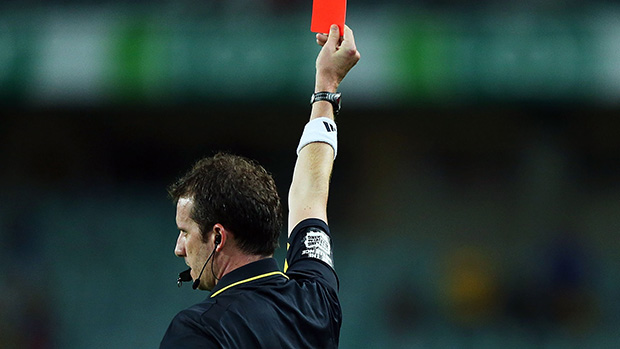Chances are that as you read this column somewhere in the world someone just got a red card. And as he or she leaves the field, wherever they are in the wide world of football, the player knows one thing: “I’m out for the next game”.
Chances are that as you read this column somewhere in the world someone just got a red card. And as he or she leaves the field, wherever they are in the wide world of football, the player knows one thing: “I’m out for the next game”.
That’s football. Everywhere in the world. That’s what getting a red card means. Automatic suspension.
Except, in a very few places, it’s not always the case. The Hyundai A-League is one of the few competitions in the world where there is a formal process to deal with “obvious errors” by referees.
This task is assigned to the Match Review Panel, independent of FFA management. The MRP is made up of former players and referees, each with years of experience and insight.
This formal process was brought in after the third season of the Hyundai A-League to ensure there is a system to fix gross or obvious errors – travesties of justice.
It’s not intended to be a process to re-referee the game and never can be. That’s why the test is not whether the MRP thinks it was “soft” red card or not, or a player should have received a yellow card instead of a red card.
The test is whether there is no doubt that the incident didn’t deserve any sort of a card at all. That’s a big difference. We’re not talking about nuances. We’re talking about a very clear and factual assessment.
If an incident didn’t warrant any card at all, then awarding a red is an “obvious error”. In a clear cut case, the red card should be rescinded.
It’s not about deciding an incident should have received a yellow card instead of a red, and retrospectively entering a yellow card against the player’s tally for the season and wiping the automatic suspension.
There is a place for administrators to step in after a game and correct what happened in the game. But this power needs to be used rarely and cautiously. Otherwise we risk changing football from a game played in 90 minutes on the pitch in front of the fans to a game played out a day or so after the whistle in a room by administrators watched by nobody.
In the recent case involving Nicola Petkovic of Sydney FC, the members of the Match Review Panel got it right. They applied the “obvious error” test as they are charged to do under the A-League Disciplinary regulations.
They determined that it was not a case where the referee had shown a red card when no card was warranted. The MRP found that at least a yellow card was appropriate. If you watch the replay of the incident, that finding is self-evident.
Of course, the debate rages and that’s the great passion of football people everywhere. Every referee decision, every team selection, every game is subject to opinions of fans and pundits.
In the debate over the Petkovic ruling, there were questions raised about whether the MRP panel members have been in the job too long. That’s wrong and unfair. It’s like playing the man, not the ball.
The regulations are black and white. The MRP has a job to implement them. Having panel members who are experienced at reviewing incidents is a positive.
Not only does experience make their decision-making better, it ensures as much consistency as possible, week in, week out from season to season. Being consistent and predictable is at the heart of the MRP’s role – to apply the rules in the same way to the different incidents reviewed.
Over the past seven seasons, the MRP have done a fine job. The panel has the credibility and track record. In the latest case, they got it right, again.
















